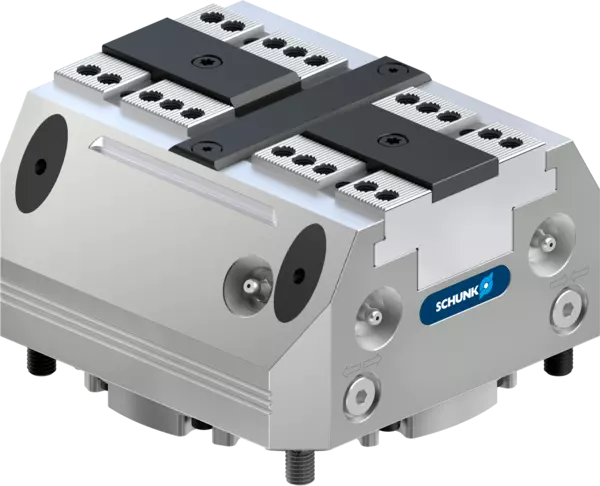KSP3-SM IOL
Sensory clamping force blocks
Compact, pneumatically actuated powerhouses with sensory monitoring unit and IO-Link interface
Description
Advantages – Your benefits
- All features from the KSP3 series remain unchanged
Tried-and-tested TANDEM technology, ideally suited for automation applications - Integrated jaw monitoring via a Hall sensor
Knowing exactly where the jaws are located - Integrated pressure sensor
Determination of the current operating pressures in the two cylinder chambers - Electronics integrated in the vise
Signal processing is done exclusively in the clamping device - Signal transmission via IO-Link
For easy integration in commonly used fieldbus systems - Maximum process reliability
Thanks to various query options and transmission of error messages - Force amplification for O.D. clamping via spring force
Increased clamping force for heavy metal-cutting tasks as well as maintenance of the spring tension during storage - Precision wedge hook clamping force block for top-quality demands
Allows excellent machining results - Square design with ideal external contour
Ideal for 6-sided machining in two set-ups with the best lateral accessibility - Base jaws with tongue and groove and fine serration as a dual interface as standard
High flexibility of system jaws - Hardened and extremely rigid base body
Therefore a longer service life at highest precision. Even with maximum clamping force
Options and special information
- Pneumatic clamping force blocks with sensory monitoring unit
TANDEM KSP3-SM IOL from SCHUNK stand for high-performance, pneumatically actuated clamping force blocks with additionally integrated sensory monitoring unit. These clamping force blocks have been specifically developed for automated processes in which the signal is to be transferred directly to the machine control. This is the standard version of the KSP3 vises, which has the monitoring unit implemented instead of the cover below the cylinder. With the help of this integrated sensor system, both the jaw position and the current actuation pressure can be monitored and transferred to the machine control via an IO-Link interface. The electronics are fully integrated into the monitoring unit.

